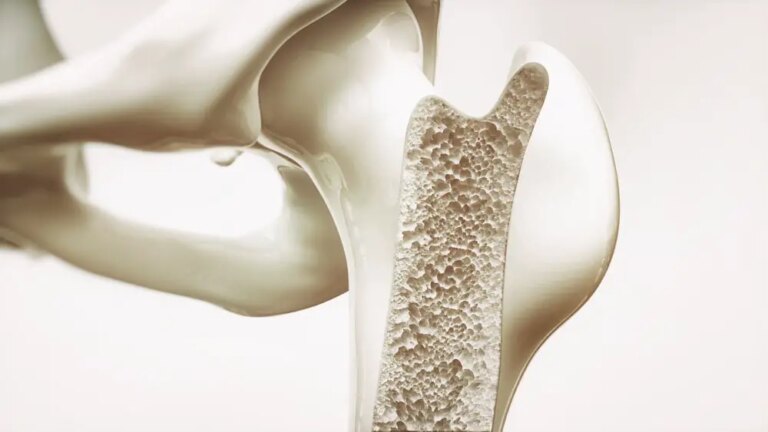For generations, milk has been championed as a fundamental component of a healthy diet, especially for children, due to its rich content of calcium and other essential nutrients purported to strengthen bones.
However, emerging studies now challenge this long-held belief, suggesting that the relationship between milk consumption and bone health may not be as straightforward as previously thought.
Recent research points to potential adverse effects associated with regular intake of pasteurized milk, including an increased risk of osteoporosis and other serious health conditions.
The Link Between Drinking Milk and Osteoporosis
Extensive research has challenged the traditional view that milk consumption is inherently beneficial for bone health. A landmark study published in the BMJ tracked tens of thousands of individuals over several decades, revealing that higher milk consumption was associated with an increased risk of bone fractures and a higher incidence of osteoporosis, especially among women. These findings are particularly concerning given that women are often the primary target of marketing campaigns promoting milk to prevent osteoporosis.
The study indicates that the bioavailability of calcium from pasteurized milk is not as effective as once believed. The pasteurization process alters the structure of calcium into a form that the body struggles to absorb.
Without proper absorption, the calcium cannot perform its intended role of strengthening the bones. Instead, the body may leach calcium from the bones to compensate, paradoxically weakening them over time and increasing the risk of fractures.
Moreover, the dietary advice that has long been disseminated by health organizations and the dairy industry may need revisiting in light of these findings. The assumption that milk is a necessary part of a diet for bone health is rooted in decades of dietary guidelines; however, the emerging evidence suggests a need for a broader perspective on dietary sources of calcium and strategies for preventing osteoporosis that do not rely heavily on milk.

Does Milk Cause Inflammation? Examining the Evidence
The question of whether milk consumption directly leads to inflammation has been a topic of considerable debate among researchers and health professionals. While some studies suggest a clear association between dairy intake and inflammatory markers in the body, others propose that the relationship may be more nuanced and influenced by various factors such as individual differences in metabolism and gut health.
One line of evidence supporting the idea that milk causes inflammation stems from research indicating higher levels of inflammatory molecules in individuals who consume larger quantities of dairy products, particularly milk. These findings suggest a potential link between milk consumption and systemic inflammation, which, as mentioned earlier, can contribute to the development of chronic diseases.
However, it’s essential to consider the context in which these studies are conducted. Factors such as the type of dairy product consumed, processing methods, and individual health status can all influence the inflammatory response to milk. For example, fermented dairy products like yogurt and cheese contain lower levels of lactose and galactose compared to milk, potentially reducing their inflammatory impact.
Additionally, the inflammatory effects of milk may vary among individuals based on their genetic makeup and overall dietary patterns. Some people may be more sensitive to the inflammatory properties of milk due to underlying health conditions or genetic predispositions, while others may not experience significant adverse effects.
Despite these complexities, a growing body of evidence suggests that reducing or eliminating dairy consumption may benefit individuals with inflammatory conditions or those looking to optimize their overall health. By adopting a more plant-based diet rich in fruits, vegetables, whole grains, and alternative sources of calcium and protein, individuals can potentially mitigate inflammation and reduce their risk of chronic diseases associated with dairy consumption.
The Role of Dairy in Cancer Development
Beyond its potential impact on bone health and inflammation, milk consumption has also been implicated in the development of certain types of cancer. Central to this concern is the presence of insulin-like growth factor 1 (IGF-1) in milk, a hormone that plays a crucial role in promoting cell growth and proliferation.
Studies have shown that diets high in animal proteins, including those found in milk, tend to elevate levels of IGF-1 in the blood. This increase in IGF-1 has been linked to a higher risk of various cancers, including breast, prostate, and colon cancer. The growth-promoting effects of IGF-1 create an environment conducive to tumor formation and progression, making it a significant concern for cancer prevention strategies.
Furthermore, the industrial farming practices commonly employed in dairy production may exacerbate this issue. Cows are often treated with synthetic hormones to boost milk production, further increasing the levels of hormones like IGF-1 present in dairy products. This artificial manipulation of hormone levels poses additional health risks to consumers and underscores the importance of considering the source of dairy products in one’s diet.
While the link between dairy consumption and cancer risk is still a topic of ongoing research, evidence suggests that reducing or eliminating dairy intake may be a prudent step in reducing the risk of certain cancers. Adopting a plant-based diet rich in fruits, vegetables, and whole grains not only provides essential nutrients but also offers protective benefits against cancer and other chronic diseases. By making informed dietary choices, individuals can take proactive steps to safeguard their health and well-being.

Healthier Options for Bone Health and Overall Well-being
Given the potential risks associated with regular dairy consumption, many individuals are seeking alternative sources of nutrients traditionally found in milk. Fortunately, there are numerous dairy-free options available that not only provide essential nutrients but also offer additional health benefits.
- Plant-based milk: One popular alternative to cow’s milk is plant-based milk, such as almond milk, soy milk, coconut milk, and oat milk. These alternatives are often fortified with calcium, vitamin D, and other essential nutrients to support bone health. Additionally, they are naturally lower in saturated fat and cholesterol compared to cow’s milk, making them a heart-healthy choice for those concerned about cardiovascular health.
- Fortified plant-based yogurts and cheeses: They offer a similar taste and texture to their dairy counterparts without the potential inflammatory effects. These products are often made from ingredients like almonds, cashews, or soy, providing a good source of protein and probiotics for gut health.
- Whole foods: Furthermore, incorporating more whole foods into your diet, such as leafy greens, legumes, nuts, and seeds, can help ensure adequate intake of calcium and other nutrients essential for bone health. These nutrient-rich foods not only support bone strength but also contribute to overall well-being by providing antioxidants, fiber, and other beneficial compounds.
By diversifying your diet and exploring alternative sources of nutrients, you can reduce reliance on dairy products while still meeting your nutritional needs. Whether you choose plant-based milk, yogurt, cheese, or whole foods, prioritizing variety and quality in your diet can contribute to better health outcomes in the long term.
My Personal RX on the Dairy Dilemma
As a doctor dedicated to promoting holistic health, I’ve compiled some personalized tips to help navigate the complexities of the dairy dilemma and support your overall well-being.
- Prioritize Plant-Based Alternatives: Swap cow’s milk for fortified plant-based options like almond milk or soy milk to support bone health without the potential risks associated with dairy consumption.
- Boost Bone Strength with Ultra Cal-Mag: Incorporate Ultra Cal-Mag supplements enriched with various forms of calcium and magnesium into your daily routine to support bone health and muscle function.
- Diversify Your Diet: Explore a wide range of nutrient-rich foods, including leafy greens, legumes, nuts, and seeds, to ensure adequate intake of calcium and other essential nutrients without relying heavily on dairy products.
- Educate Yourself: Empower yourself with knowledge by utilizing my comprehensive Protocol guide to living your best life, focusing on holistic health and informed dietary choices.
- Limit Dairy Intake: While dairy can be enjoyed in moderation, be mindful of its potential inflammatory effects and consider reducing or eliminating dairy consumption, especially if you have underlying health concerns.
- Choose Fermented Options: Opt for fermented dairy products like yogurt and cheese, which contain lower levels of lactose and galactose, potentially reducing their inflammatory impact on the body.
- Focus on Whole Foods: Emphasize whole foods in your diet, such as fruits, vegetables, whole grains, and lean proteins, to provide essential nutrients and antioxidants for optimal health.
- Consult a Healthcare Professional: If you have specific dietary concerns or health conditions, seek guidance from a qualified healthcare professional who can provide personalized recommendations tailored to your individual needs and goals.
By implementing these tips into your lifestyle, you can navigate the dairy dilemma with confidence and prioritize your health and well-being for years to come.
Sources:
- Pasteurized milk: myths and proven facts. (n.d.). HealthyChildren.org. https://www.healthychildren.org/English/healthy-living/nutrition/Pages/Pasteurized-Milk-Myths-and-Proven-Facts.aspx
- Michaëlsson, K., Wolk, A., Langenskiöld, S., Basu, S., Lemming, E. W., Melhus, H., & Byberg, L. (2014). Milk intake and risk of mortality and fractures in women and men: cohort studies. BMJ, 349(oct27 1), g6015. https://doi.org/10.1136/bmj.g6015
- Ulven, S. M., Holven, K. B., Gil, Á., & Rangel-Huerta, Ó. D. (2019). Milk and dairy product consumption and inflammatory biomarkers: An Updated Systematic Review of randomized clinical trials. Advances in Nutrition, 10, S239–S250. https://doi.org/10.1093/advances/nmy072
- Dairy products linked to increased risk of cancer | University of. (2022, May 6). https://www.ox.ac.uk/news/2022-05-06-dairy-products-linked-increased-risk-cancer
- Kalyan, A. R. (n.d.). Dietary choices and their impact on cancer risk. https://continentalhospitals.com/blog/dietary-choices-and-their-impact-on-cancer-risk/




















